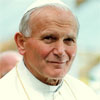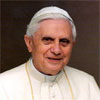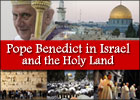“We receive a lot of help and we are grateful but at the same time we say we need more. What we need is peace. We don’t only [want] to be a begging Church, we don’t want to be beggars with a licence. I don’t like this. We need a political horizon, it’s time to put an end to the Wall, the Checkpoints, it’s time for a Palestinian State, it’s time for an end to our problems with visa’s. The majority of our priests, nuns, schools, families are in Jordan. We need a link to Jordan we need to be able to move with freedom and liberty for our pastoral work. I am not speaking about politics, let’s leave politics to the politicians, I am a bishop, we want to move for our pastoral work and we are handicapped”.
"Time to put an end to the Wall"? -- Granted that freedom for clergy and religious is a legitimate concern in the administration of their pastoral duties, it is unfortunate that the Archbishop gives little thought to the welfare of those for whom "The Wall" and the "Checkpoints" were established:
Before the construction of the fence, and in many places where it has not yet been completed, a terrorist need only walk across an invisible line to cross from the West Bank into Israel. No barriers of any kind exist, so it is easy to see how a barrier, no matter how imperfect, won't at least make the terrorists' job more difficult. Approximately 75 percent ofthe suicide bombers who attacked targets inside Israel came from across the border where the first phase of the fence was built.Source: Israel’s Security Fence by Mitchell Bard.
During the 34 months from the beginning of the violence in September 2000 until the construction of the first continuous segment of the security fence at the end of July 2003, Samaria-based terrorists carried out 73 attacks in which 293 Israelis were killed and 1950 wounded. In the 11 months between the erection of the first segment at the beginning of August 2003 and the end of June 2004, only three attacks were successful, and all three occurred in the first half of 2003.
Since construction of the fence began, the number of attacks has declined by more than 90%. The number of Israelis murdered and wounded has decreased by more than 70% and 85%, respectively, after erection of the fence.
Even the Palestinian terrorists have admitted the fence is a deterrent. On November 11, 2006, Islamic Jihad leader Abdallah Ramadan Shalah said on Al-Manar TV the terrorist organizations had every intention of continuing suicide bombing attacks, but that their timing and the possibility of implementing them from the West Bank depended on other factors. “For example,” he said, “there is the separation fence, which is an obstacle to the resistance, and if it were not there the situation would be entirely different.”
He said that the second intifada was currently characterized by rocket fire, which had replaced the previous stage of suicide bombing attacks. That, he said, was because the enemy [i.e., Israel ] had found ways and means to protect itself from such attacks: “… For example, they built a separation fence in the West Bank . We do not deny that it limits the ability of the resistance [i.e., the terrorist organizations] to arrive deep within [Israeli territory] to carry out suicide bombing attacks , but the resistance has not surrendered or become helpless, and is looking for other ways to cope with the requirements of every stage [of the intifada]…” (Al-Sharq, March 23, 2008 ).Honestly, I expect the Wall will come down when Israel's enemies decide to abandon their suicide attacks.









1 comments:
Joseph D'Hippolito
said...
Is the good bishop playing the good dhimmi in expressing such sentiments? Is he expressing the expected response because it's the political thing to do to support Palestinian Christians? Why doesn't the good bishop talk w/Israeli authorities about this?
Unfortunately, the Catholic Church has historically had an attitude of entitlement when it comes to asserting itself with the authorities. That explains a lot of the behavior of Church diplomats and geopoliticians over the centuries.
Post a Comment